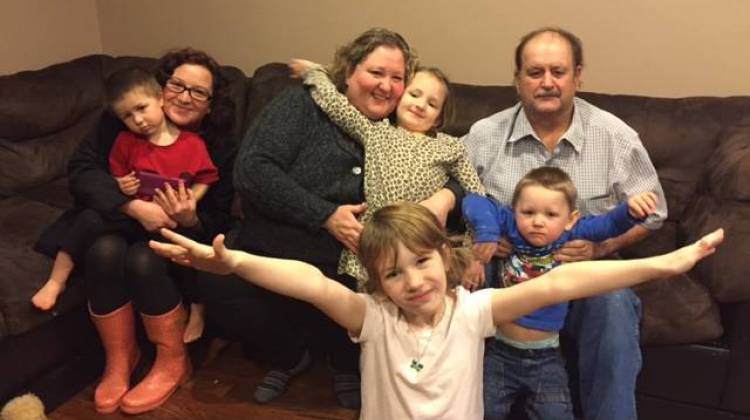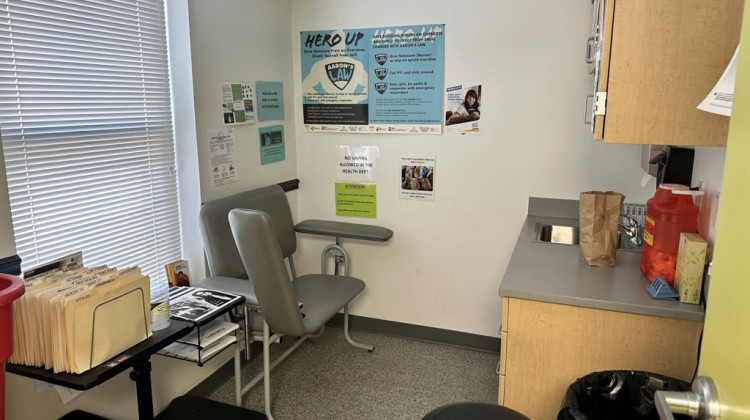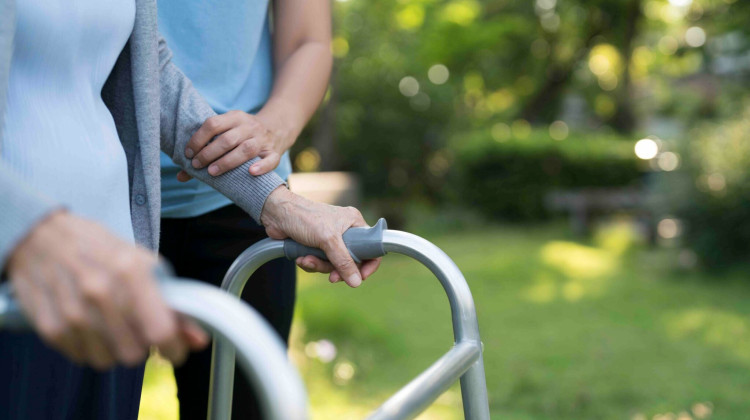Child neglect is defined as a type of abuse where people can lose custody of their children because they can’t provide the necessary care. Zoey Meisberger’s parents couldn’t care for her because of their addiction.
In 2015, there were 17,491 Children In Need of Services, or CHINS, cases filed in Indiana. This is a nearly 23 percent increase over the previous year and a 97 percent increase over the past 10 years.
Chief Justice of the Indiana Supreme Court Loretta Rush, addressed this increase in this year’s State of the Judiciary. She says the opioid epidemic is a contributing factor and is affecting people in all parts of the state.
“I have had friends, professional and personal, who have lost their child to heroin or cocaine or methamphetamine,” says Rush. “I think it’s an insidious drug. It starts off, quite often, with prescription pills, and then it just escalates.”
That’s what happened to Paula Meisberger’s youngest daughter, Brooke. She became addicted to opiates after a doctor prescribed pain medicine post-pregnancy.
“I knew something was wrong with Brooke. I thought she was being overmedicated, she was dealing with post-partum but I had no idea it was heroin,” says Meisberger.
In 2013, Meisberger was on vacation when she got the call that police arrested Brooke and her husband after they found them passed out in a car where one of their friends had overdosed. Baby Estelle was in the back seat.
“Being as we were so far away at first I just wanted Estelle because some guy had died in the car,” says Meisberger.
Estelle was only 8 months old at the time, Zoey was 3 years old – old enough to remember times when her mother and father were using. She once opened up to a court advocate while playing with a toy.
“She told the worker that the baby keeps on crying and mommy and daddy won’t wake up,” Meisberger says.
Meisberger and her husband legally adopted three of their grandchildren. Estelle and Zoey, now 4 and 6, and their brother, 2-year-old Raiden, who was born heroin-dependent.
Increasing Caseloads
The increase in cases is a strain on the Department of Child Services, or DCS. The ACLU is currently suing DCS on behalf of a caseworker who was assigned more than 40 children. Indiana law says the department must provide enough caseworkers so that the average caseload doesn’t exceed 17 children.
DCS says it’s complicated. Cases overlap and are always in flux, multiple people may be involved in a single case, and most workers realize their caseload may not be compliant with the standard. Right now they have around 2,300 workers with open cases.
Court Appointed Special Advocates or CASA volunteers speak for and represent the best interests of abused or neglected children in the courts.
There are more than 5,000 children waiting for a CASA appointment, 75 of those children are in Monroe County. Director of CASA in Monroe County Kristin Bishay says their caseload has doubled in the past two years.
“There are tremendous more cases, cases are staying open much longer, I can tell you that cases that were open due to some addiction of a parent used to be 70-75 percent of our cases. Now it’s a good 95 percent of our cases,” says Bishay.
Brenda McLane is a volunteer for CASA, and more like her are needed in every county.
“Those kids' faces,” says McLane. “For me getting to see those children and how they light up and to have fun with them, personally, that’s my motivation.”
Bishay says Indiana’s child abuse laws are too weak, and she would like to see stricter policies in place and more support for prevention programs.
Identifying Abuse
Indiana law says everyone who suspects abuse or neglect of a child should report to the Child Abuse Hotline.
But the process of identifying abuse is difficult and determining intervention is complicated.
Susie’s Place provides a safe place for children to be interviewed, to determine next steps. Executive director and founder Emily Perry says they are also seeing a rise in cases related to opioid addiction.
“Sometimes that means kids are staying at home and sometimes that means kids aren’t able to stay home to ensure their safety, but what we do know is we’ll never be able to investigate our way out of this crisis,” Perry says.
Susie’s Place has locations in Avon, Bloomington and, soon, Terra Haute.
“What we know about kids that are going through serious abuse or neglect is that they are experiencing trauma on a very high level,” says Perry.
Perry says the cycle of addiction is troubling.
“So what we’re seeing is kids that are struggling in a home where drugs are prevalent are the same kids that are sometimes being drawn into drugs themselves,” says Perry.
She says resources, prevention, intervention and treatment all have to be part of the solution.
Parental Rights
The Supreme Court’s annual report finds termination of parental rights has also increased by 18 percent.
DCS says it’s federally mandated to make all attempts to reunite a child with their parents but that wasn’t going to work for Paula Meisberger who insisted if she was going to take custody of the children it was going to be permanent.
“Our kids need a voice and until they put tougher laws in place, these kids don’t have a voice, why do these little ones have to suffer and how are we breaking the cycle here,” says Meisberger.
DCS is asking for an additional $50 million from the Indiana legislature to cover the growing number of abuse and neglect cases.
 DONATE
DONATE







 Support WFYI. We can't do it without you.
Support WFYI. We can't do it without you.